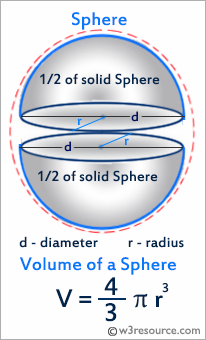C Exercises: Calculates the volume of a sphere
C Input Output statement and Expressions: Exercise-2 with Solution
Write a C program that calculates the volume of a sphere.
C Programming : Volume of a sphere
A sphere is a perfectly round geometrical object in three-dimensional space that is the surface of a completely round ball.
In three dimensions, the volume inside a sphere is derived to be V = 4/3*π*r3 where r is the radius of the sphere

Sample Solution:
C Code:
#include <stdio.h>
float myradius; /* radius of the sphere */
float myvolume; /* volume of the sphere (to be computed) */
char line_text[50]; /* a line from the keyboard */
/* the value of pi to 50 places, from wikipedia */
const float PI = 3.14159265358979323846264338327950288419716939937510;
int main() {
printf("Input the radius of the sphere : ");
fgets(line_text, sizeof(line_text), stdin);
sscanf(line_text, "%f", &myradius);
myvolume = (4.0 / 3.0) * PI * (myradius * myradius * myradius); /* volumn=(4/3) * pi * r^3*/
printf("The volume of sphere is %f.\n", myvolume);
return(0);
}
Sample Output:
Input the radius of the sphere : 2.56 The volume of sphere is 70.276237.
Flowchart:

C Programming Code Editor:
Improve this sample solution and post your code through Disqus.
Previous: Write a C program that convert a temperature from Centigrade to Fahrenheit.
Next: Write a C program that prints the perimeter of a rectangle to take its height and width as input.
What is the difficulty level of this exercise?
Test your Programming skills with w3resource's quiz.
C Programming: Tips of the Day
Static variable inside of a function in C
The scope of variable is where the variable name can be seen. Here, x is visible only inside function foo().
The lifetime of a variable is the period over which it exists. If x were defined without the keyword static, the lifetime would be from the entry into foo() to the return from foo(); so it would be re-initialized to 5 on every call.
The keyword static acts to extend the lifetime of a variable to the lifetime of the programme; e.g. initialization occurs once and once only and then the variable retains its value - whatever it has come to be - over all future calls to foo().
Ref : https://bit.ly/3fOq7XP
- New Content published on w3resource:
- HTML-CSS Practical: Exercises, Practice, Solution
- Java Regular Expression: Exercises, Practice, Solution
- Scala Programming Exercises, Practice, Solution
- Python Itertools exercises
- Python Numpy exercises
- Python GeoPy Package exercises
- Python Pandas exercises
- Python nltk exercises
- Python BeautifulSoup exercises
- Form Template
- Composer - PHP Package Manager
- PHPUnit - PHP Testing
- Laravel - PHP Framework
- Angular - JavaScript Framework
- Vue - JavaScript Framework
- Jest - JavaScript Testing Framework
